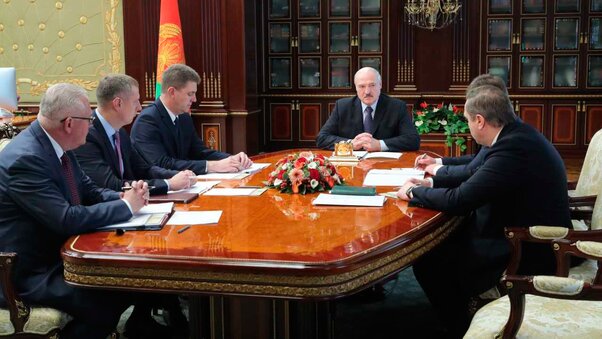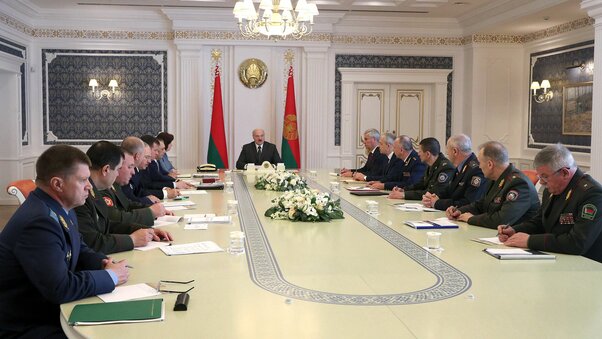Working trip to Grodno Oblast
- 22
- 3
Belarus President Aleksandr Lukashenko paid a working trip to Grodno Oblast on 16 June.
There are good opportunities for Belarus’ economic development, and it depends on how quickly the world will recover from the pandemic, the president is convinced.
“Life is livable. The world just needs to cope with this pandemic as soon as possible. Belarus has an export oriented economy. The sooner the world opens after this disease, the better it will be for Belarus,” the head of state stressed.
Speaking about agriculture, Aleksandr Lukashenko said that the weather is very good right now. “I have been even thinking that it is because of the reduced number of flights due to the pandemic. I remember such weather from childhood. There were thunders and rains at this time of the year,” he noted.
“This is good for the agricultural and processing industries. We will have raw materials, milk and meat. This is great indeed,” the Belarusian leader said.
He added that now it is essential to focus on the procurement of fodder, get ready for the harvesting of grain and vegetables.
In Grodno the president met with senior executives of the region. “This is not a pre-election session, meeting or conference,” the head of state said at the beginning of the event. “The situation in Belarus requires more discussion, explanations, first of all, for the country’s senior executives.”
The president remarked that a similar meeting was held in Mogilev. “Today we need to provide the information about what is going on in our country and to answer some pending, even if unpleasant, questions,” the Belarusian leader said.
“I am always pleased to come to Grodno Oblast. This is a wonderful region, the most comfortable place for living in our country. When you see well-kept fields, cleanness and order (almost everywhere in your region), you make sure once again that hard-working, sincere and committed people are living here. If you like, this is a calling card of Grodno Oblast and its people,” Aleksandr Lukashenko remarked.
The president recalled that in the 1990s he started his election campaign in Grodno Oblast, but every region of Belarus is special for him. “My Motherland is Belarus. I started my election campaign here [in Grodno Oblast], served in border troops in Brest. Gomel Oblast will forever remain in my heart – I lived through the most difficult times of my presidency together with Gomel Oblast when we were mitigating the consequences of the Chernobyl accident. Vitebsk hosts the Slavianski Bazaar festival every year… Mogilev Oblast is the place where I spent my childhood and youth,” he said.
“There is no need to explain that welfare and wellbeing depend on honest and hard work, that wealth does not come out of the blue,” the head of state said. The wealth that comes easily is short-lived and will never benefit people and the state in the future, he said.
Aleksandr Lukashenko emphasized that Grodno Oblast is a special place, a near-border territory, and a frontier outpost. “This is why it is important. Like nobody else, you always feel a strong impact from your neighbors. And you remain true patriots of Belarus supporting our country’s commitment to sovereign development,” the president said.
Aleksandr Lukashenko remarked that in Soviet times Grodno Oblast was one of the best regions in the entire Soviet Union. It was an example for many countries and regions, and now Grodno Oblast is one of Belarus’ leading regions. “I visited many enterprises, learned agriculture here. You have always been in the vanguard of the manufacturing industry and agribusiness. Grodno Oblst was a beacon of development in the Soviet Union,” the president said.
According to the head of state, agriculture is a pride of the region. Grodno Oblast is the country’s leading region in terms of agricultural production and grain yield. “Even in the manufacturing sector you have preserved the output almost at the level of last year despite the difficult situation with coronavirus,” the Belarusian leader remarked. “These efforts will be duly appreciated later. Today not all will understand what it means to preserve the level of production in this situation.”
According to Aleksandr Lukashenko, Belarus does not have resources which it can sell and sustain from it with stopped production. We should always work hard.
He said that it was not always that things were like that: “Some time ago, right after the collapse of the Soviet Union, some locals worked as shuttle traders bringing goods from Poland, others were paid beggary salaries at dilapidated enterprises. Fortunately, we took necessary measures back then. And today all of us can be proud of Grodno Oblast’s achievements.
The president also noted that for the past 25 years the volume of industrial output in the region has more than quadrupled, merchandise export surged almost five times. In the last two years alone, the average salary in the region has almost doubled. As of June 1, there were no arrears on its payment.
Since 1995, almost 115,000 families (of which 10,000 large families) have improved their living conditions. Housing per capita index is one of the highest in the country, the president stressed.
Since the country gained independence the region has implemented major investment projects in mineral fertilizers, chemical and food processing, and wood working.
The Belarusian nuclear power plant, the largest project in the history of the country, will go operational soon. “Its importance for the country’s energy security and economy in general is simply colossal," Aleksandr Lukashenko said.
“We have always responded to the requests of the region authorities to help, to add resources, because we knew that every ruble would be invested in ‘fertile soil’. The development of a network of roads, infrastructure projects, including in the social sector, support for the restoration of iconic cultural objects... You are well aware of all this,” the head of state added.
Aleksandr Lukashenko stressed that despite the achievements, it is too early to feel complacent. A quarter of the presidential instructions on Grodno Oblast has not been fulfilled so far, including those related to efficient social and economic development, import substitution, job creation, landscaping and cleanup works, construction, housing and utilities. “You do everything at the highest qualitative level. Especially it is true about the construction sector. Well done. Still we need to be more proactive however,” the head of state said.
Among the important goals are new production facilities using local raw materials in small districts of Grodno Oblast such as Voronovo, Zelva and Svisloch. “Our people live there. It is a beautiful region. We need to use this area, work more actively in small towns,” the president emphasized.
“The launch of the Belarusian nuclear power plant also requires fresh and promising solutions to the use of the surplus of energy. This is an issue to solve for the Grodno Oblast Executive Committee and the government,” Aleksandr Lukashenko said.
The head of state stressed that when taking the decision to build the Belarusian nuclear power plant he proceeded from the fact that the project was an advanced technology in the first place. The country is currently gaining new experience and has already started training specialists in the area. “As soon as we began building the plant, we saw that we needed new personnel, new knowledge, technology. The plant is our common goal,” the president said.
“For you and for me, the safety [of the nuclear power plant] is more important that for Lithuania, Poland, or Germany. If we want to possess advanced technologies, use cheap electricity, and drive electric cars, we need to take this step. Time will show. You can only see the big picture from a distance,” the Belarusian president noted.
By the way, as of today nuclear power plants are operational in 31 countries. These are 190 nuclear power plants with 449 power-generating units with the aggregate capacity of about 390,497MW. There are nuclear power plants in the vicinity of the Belarusian borders – the Ignalina nuclear power plant in Lithuania, the Chernobyl nuclear power plant in Ukraine, the Smolensk nuclear power plant in Russia, etc. “Belarus is surrounded by these power plants,” the president stressed. He is convinced that the criticism which can be sometimes heard from abroad regarding the construction of the Belarusian nuclear power plant is caused by competition because electricity is also a commodity.
The visa waiver gave Grodno Oblast a strong impetus, Aleksandr Lukashenko noted. Since it was launched, the region has welcomed almost 300,000 tourists, without taking into account Russian visitors. This is why raising tourist appeal and developing infrastructure of the Brest-Grodno visa-free area is another important line of work. “By the way, introducing the visa waiver was a conscious decision. We understood that we will benefit from it,” the head of state remarked.
According to him, Grodno Oblast is a vivid example of a place where various cultural, ethnic, and religious traditions are entwined, which ensures a high level of tolerance and mutual understanding between local residents. “When I think about your festival [the Festival of National Cultures in Grodno], I am happy for Grodno residents. This is your achievement, as good as the Slavianski Bazaar, or even better. Thank you for this, well done. You have earned respect all over the world,” Aleksandr Lukashenko said.
Aleksandr Lukashenko said: “As we make plans for the next five-year term, we should borrow a good example from the Soviet times. You have to remember that those plans clearly stipulated what facilities and installations are supposed to be commissioned and mandatory budget appropriations were specified. Good investments mean rich people and a rich region. We have to make up our minds on the main facilities and installations we will build in the next five-year term.”
Speaking about foreign investments, Aleksandr Lukashenko noted that Belarus needs no investments for the sake of investment already. “While 10-15 years ago we talked about investments for the sake of investments in order to make or keep jobs, we don’t need this kind of investments today. We are not going to build enterprises only for the sake of keeping people employed. Yes, jobs are needed, but the problem is not that painful. We need investments and the construction of manufacturing facilities that can produce profits. It is the key thing. There are different kinds of investments,” the Belarusian leader stated.
Aleksandr Lukashenko pointed out that many investment projects have been implemented in Belarus since the country became independent. In particular, China has opened credit lines to the tune of billions of U.S. dollars but the money has not been fully spent. “I will never agree to giving money to someone who has to think about what needs to be built. We should build the things that we need. We need things that generate profits and sell well on international markets,” the head of state explained.


